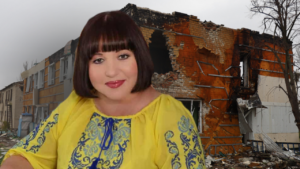The Russians Have Transferred a Spanish Volunteer Abducted in Kherson out of Crimea: 77-year-old Mario Has Gone Missing
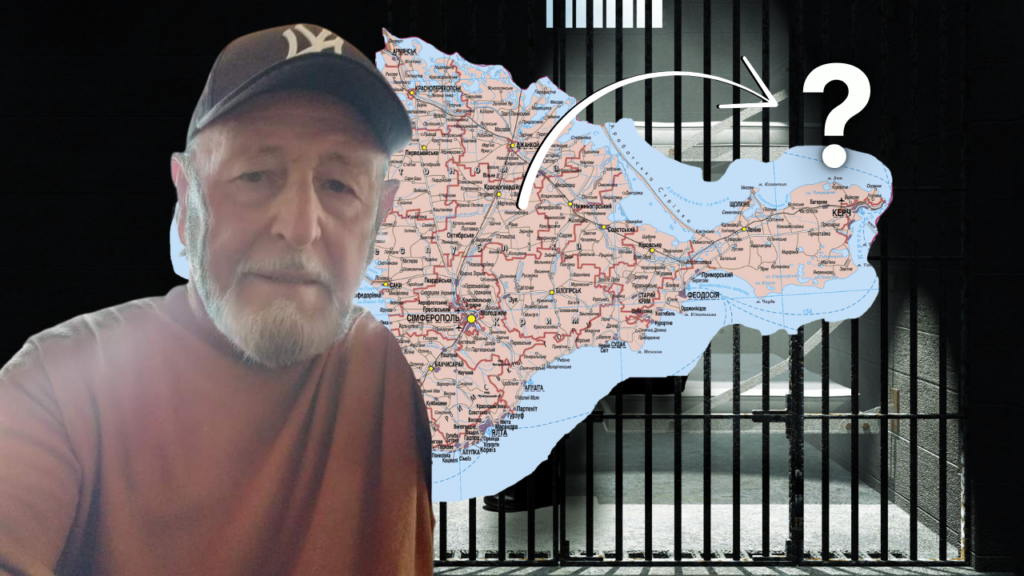
The Russian military prosecutor’s office claims that Spanish volunteer Mariano Garcia Calatayud left Crimea for the Kherson region. Before that, he had been held for over a year in a detention center in Simferopol after being abducted in Kherson. The current whereabouts of the 77-year-old man, who suffered a heart attack while in captivity, remain unknown, and his relatives continue to search for him.
“He Stood Out a Lot”
Mariano Garcia Calatayud, known simply as Mario in Kherson, was abducted on March 19, 2022, near his home. He had just returned from a pro-Ukrainian rally and was waiting for his wife to come down from their apartment to let him in, as he had left his keys behind. It took Tetiana Maryna only a few minutes to come down for Mario, but by the time she reached the street, he was already gone. Tetiana didn’t hear any sounds from outside as she walked down, nor did she see anyone on the street. She later learned that Mario had mentioned to his interpreter that he had been followed for several days.
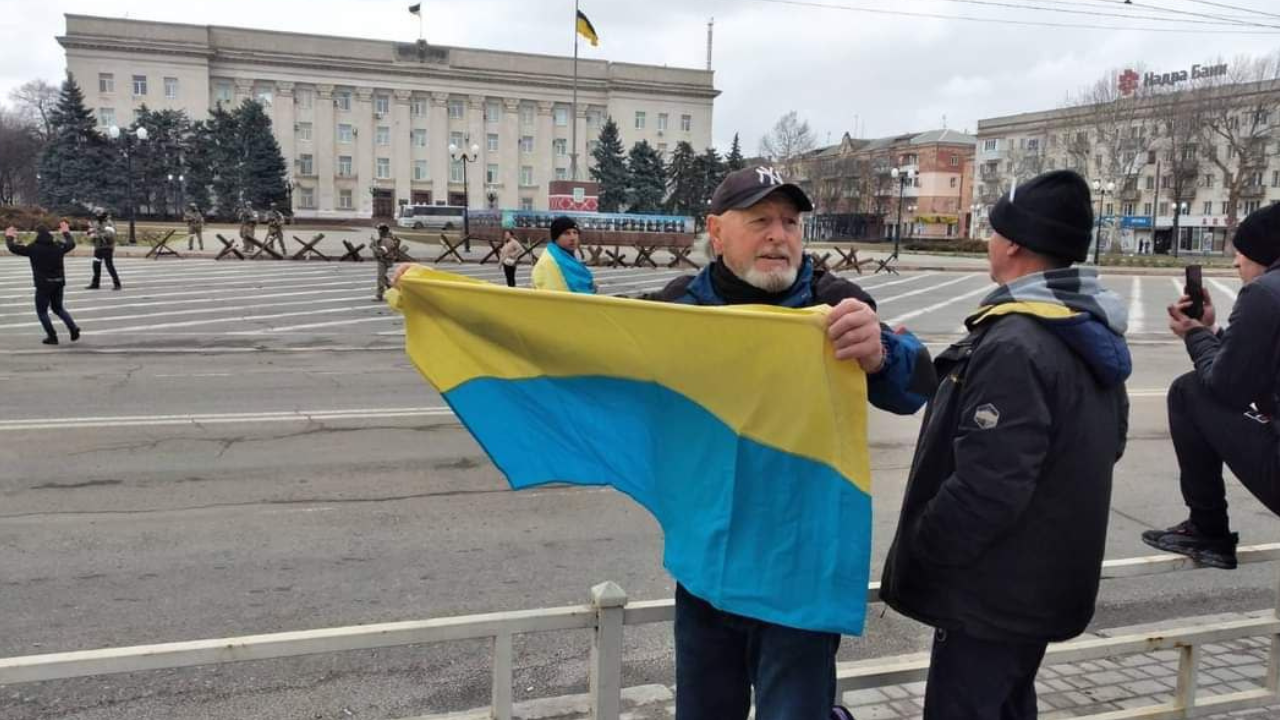
Mariano Garcia Calatayud at a pro-Ukrainian rally in Kherson following the onset of the full-scale invasion. Photo from the family archive
In Spain, Calatayud worked in the local government of a small town in Valencia and was responsible for road construction. When Russia launched its invasion of Ukraine in 2014, he took early retirement and moved to Ukraine. He first stayed in Kyiv. Later, he relocated to Kherson, which was more convenient for him to carry out his missions at the front line. He collected humanitarian aid both abroad and within Ukraine and delivered it to residents of frontline areas. He also invested his own pension to support Ukrainians affected by the war. In Kherson, he held free classes at a school with an advanced Spanish program and led a conversation club. Although he spoke little Ukrainian or Russian, he still had many local friends.
The Russians occupied Kherson on March 1, 2022, and on March 5, the first pro-Ukrainian rally was held in the city. Participants agreed to meet every day at 10 a.m. March 19 was the first time Tetiana did not attend the rally alongside Mario.
“The atmosphere was becoming tenser and tenser with each passing day,” she recalls. “We could see that it wouldn’t be long before they started dispersing us with gunfire. And that’s exactly what happened: on March 21, the protesters were shot at. Mario didn’t want me to attend the rallies.”
There wasn’t enough time to establish a territorial defense unit in Kherson. Instead, as in other cities of the region, a municipal guard was formed. Mario and Tetiana joined it. Mario could no longer support Ukrainians financially—his Spanish bank had blocked his card. Instead, he helped by providing information and giving interviews to Spanish media from the occupied city. He claimed he was ready to defend Kherson with a weapon in his hands.
“He stood out a lot,” Tetiana explains. “Firstly, he spoke loudly. Secondly, his work apartment was in a building near the Kherson Regional Administration—the very building taken over by the Russians.”
“Every time we had to walk past them, I would say, ‘Mario, let’s take the other side of the street or go another way,’” Tetiana recalls. “He would reply, ‘Why should we avoid them? They’re the ones who came here.’ As we passed by, he would shape his hands like a gun and gesture to them: ‘I’ll shoot you.’”
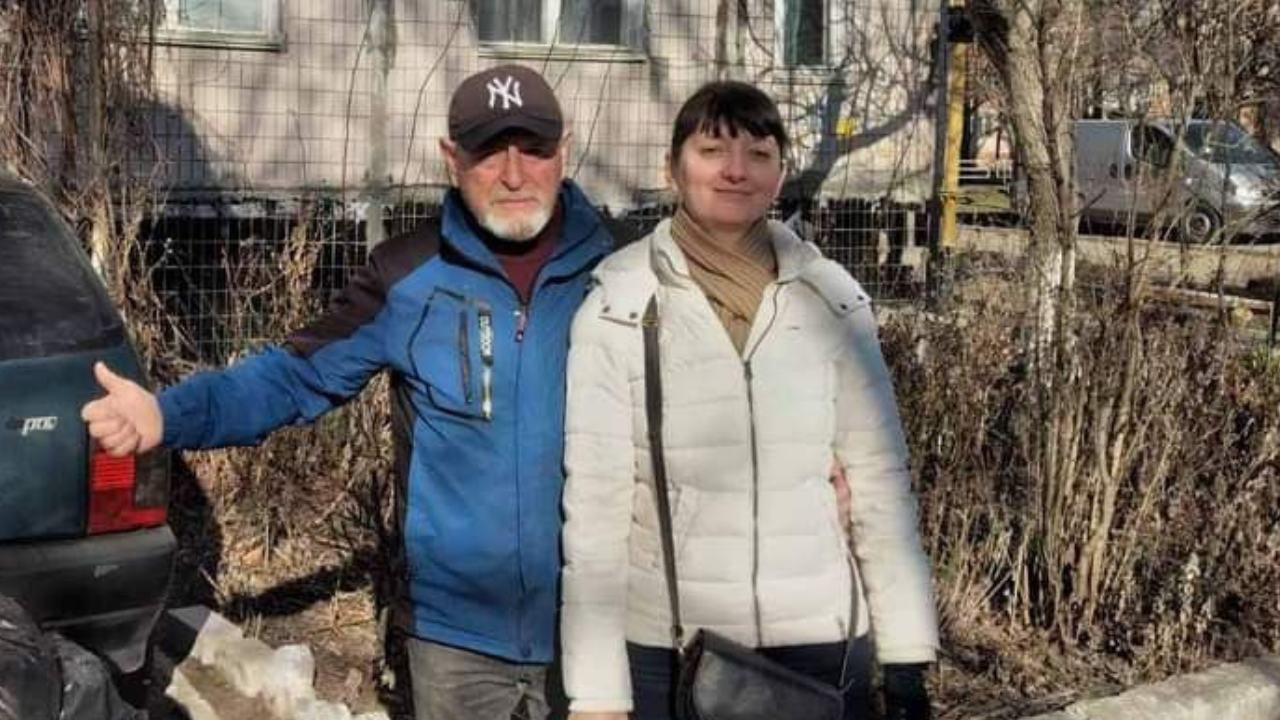
Mariano Garcia Calatayud and his wife Tatiana. Photo from the family archive
Mario never possessed a weapon in Kherson, nor did the municipal guard. Nevertheless, after news of the Spanish volunteer’s abduction became widely known, Russian military bloggers added him to a database of “foreign fighters,” which was promoted on social media by Russia’s Ministry of Foreign Affairs and its embassies around the world. The entry about Mario claimed that “in 2022, he took up arms and joined the territorial defense of Kherson.”
Until late March, Calatayud was held along with several other abducted Kherson residents in a local temporary detention facility, where he argued with the guards and shouted, “Glory to Ukraine!” Neither before nor after his abduction did the Russians come to Tatyana and Mario’s apartment or conduct searches. Tetiana learned that the occupiers were behind his disappearance only a few days later when one of the activists was released from the detention center. By that time, she had already posted information about Mario’s disappearance on Facebook. Media outlets in Spain quickly picked up the news.
Spanish Friend Vitalii
As professionally as Mario was abducted, the Russians were just as skilled at obfuscating his case, covering the tracks. “I still can’t believe this happened to me,” the volunteer’s wife continues.
A man who identified himself as Vitalii Suarez, claiming to be Mario’s friend, began commenting on Calatayud’s abduction to Spanish journalists. His real name is Vitalii Asaulenko. He is from Kherson, and his stepfather, Julio Suarez, ran a business in the region for ten years before the COVID-19 pandemic. Having remained in Spain during the pandemic, he handed over his business in Ukraine to his stepson, who was in Kherson at the time of the Russian occupation of the city. Tetiana had never heard Mario mention such a friend, and Asaulenko-Suarez had never contacted her.
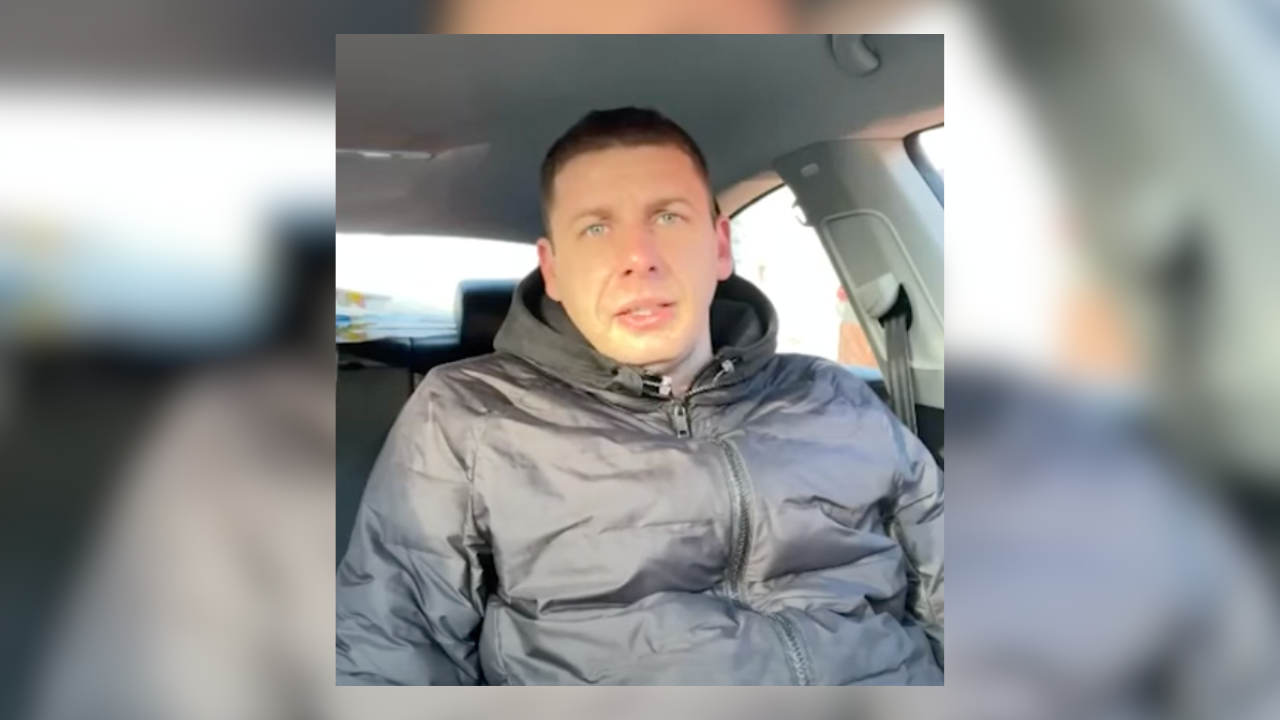
Vitalii Asaulenko, a collaborator from Kherson. Photo: Most
After the Russians entered Kherson, Asaulenko began appearing in the Spanish media as a volunteer patriot of Ukraine who raised funds to assist locals by purchasing and distributing essential items, including food. He also maintained a “patriotic” online diary under the occupation, which might have been managed by his mother in Spain. Shortly after Mario’s abduction, Asaulenko informed Spanish media that the volunteer had been released.
Media outlets and bloggers in Ukraine, Spain, and Russia had circulated this information, which resulted in the suspension of efforts to locate the volunteer. Tetiana had to personally reach out to every media outlet, blogger, and official authority in both Ukraine and Spain to refute the false claims about her husband’s release.
The Suarez family later excused themselves, stating that they had been misled. Spanish television aired a report in which Julio Suarez played a recording of a telephone conversation between Asaulenko and the man who, as he claimed, had misinformed his stepson. Tatiana recognized the voice on the recording.
Local “Contacts”
The municipal guard in Kherson was divided into district units, each with an appointed leader. In Tetiana and Mario’s district—the central one—the leader was 25-year-old actor and opera singer Danylo Sanitar. “Tall, with strong organizational skills, he also directed people during the rallies,” Tetiana recalls. It was his voice she recognized in the recording of Asaulenko’s phone call, where Sanitar explained how he had also been misled. Tetiana hadn’t known that Sanitar was allegedly negotiating with the Russians about Mario’s release.
Danylo Sanitar hails from Mykolaiv. In 2016–2017, he studied in Lviv, where he worked at the Lviv National Academic Opera and Ballet Theatre. Probably, it was not for long because, at the end of 2017, he faced fraud charges in court. According to court documents available in the judicial registry, he borrowed laptops from seven coursemates, supposedly for a few days, and then pawned them to receive money for bookmakers’ betting.
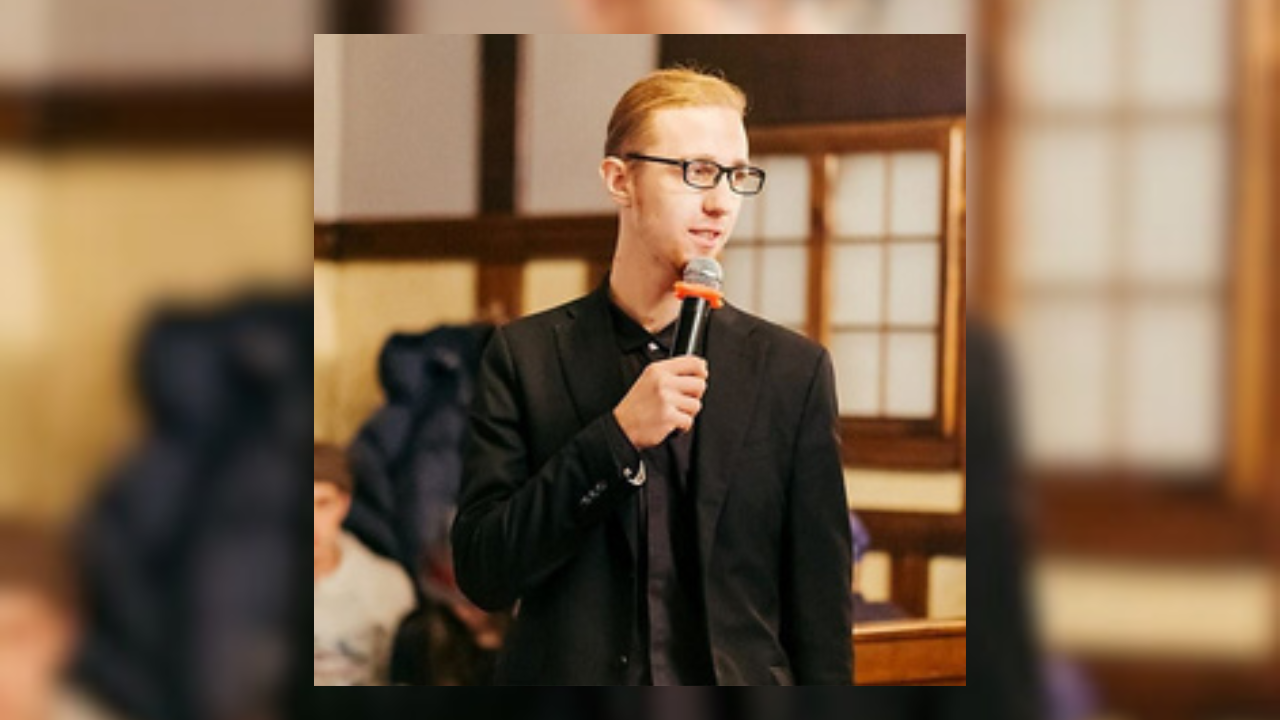
Danylo Sanitar, a collaborator from Kherson. Photo from social media
The young man admitted his guilt and compensated his coursemates for their losses. However, whether he stayed in Lviv and for how long remains unclear. Somewhere around 2023, he deleted his social media posts spanning approximately the last five years. What is known is that a few months before the full-scale invasion, he had moved to Kherson to work at a local theater.
The Prosecutor General’s Office of Ukraine believes that at the end of March 2022, the Russians recruited Danylo Sanitar. In a now-deleted social media post, he wrote, “I came myself and told them I was making cocktails and stayed with the territorial defense. The lists had already been leaked; they had already been visiting the apartments. However, I took a preemptive strike, went to them myself, and said, ‘This is who I am. I was there. I made the cocktails. But since I’m powerless and unarmed, I’m not going to do anything. Just let me live, help Kherson people, and volunteer.’ That was my communication with the Russians. You call me a collaborator who agreed to cooperate with them. I didn’t collaborate—I established contact to stay with the people.”
Danylo Sanitar did not specify when exactly he made contact with the Russians. He claimed that in the spring of 2022, he traveled to Crimea several times to bring medicine back to Kherson, describing it as a humanitarian mission in his role as one of the leaders of the municipal guard. In the summer of that same year, he called on people to donate money to his bank card to support people in need—though by then, he was already abroad. He called himself a patriot of Ukraine but emphasized that he would “not fight for this authority.” That same summer, the man returned to the Russian-occupied part of the Kherson region. Vitalii Asaulenko took the same step after a brief stay in Spain.
Since then, the careers of both men have taken off. Sanitar first became a TV presenter on a local channel and a performer at patriotic events organized by Russian authorities in the occupied territories. Around the fall of 2023, he moved to Moscow, where he began participating in Youth Parliament sessions under the State Duma and performing at patriotic concerts in the Russian capital. When the war-opposing leading actors exited the Helikon Opera, the ambitious young man from Mykolaiv stepped into the spotlight.
Asaulenko, in his turn, continued to present himself as a businessman who provided humanitarian aid to locals. By the end of 2023, however, he had assumed the role—either as an assistant or advisor—under Volodymyr Saldo, the head of the Russian occupation administration in the region.
Two Years Without Any Information
During this entire period, Mariano Garcia Calatayud was detained in Simferopol’s Detention Centers No. 1 and 2, with the second facility having been constructed deliberately to hold Ukrainian civilians abducted from occupied areas, along with several foreign detainees. Although Tetiana Maryna suspected as early as spring 2022 that her husband was no longer in Kherson, Danylo Sanitar insisted that the Spanish citizen was still being held in the temporary detention facility.
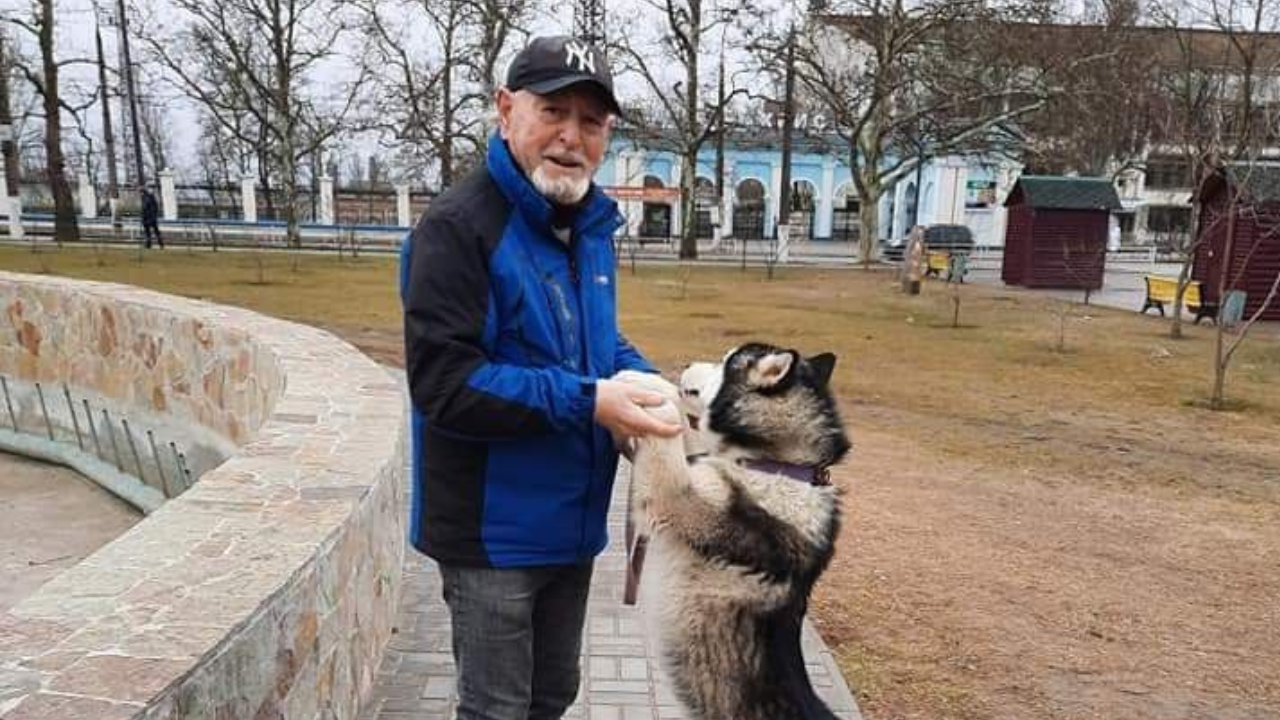
Mariano Garcia. Photo from the family archive
The Russians and local collaborators, meanwhile, told Mario’s friends that all captured foreigners had been drowned in the Dnipro River. The information seemed believable, as in June 2022, it was revealed that former soldier Vitalii Lapchuk was found in the river with a fractured skull and a weight tied to his legs. However, in September, a man was released from the Simferopol detention center, where Ukrainian prisoners were held. He testified that he had shared a cell with Calatayud.
Until mid-2023, Tetiana had received news from several other released Ukrainians who had been held in Simferopol Detention Center No.2 along with her husband. There were other sources of information from there as well. But in the summer of that year, the flow of information abruptly stopped. The last released prisoner informed Tetiana that he had arrived in Simferopol when Mario had already been gone for a month. His former cellmates believed that the Spanish volunteer, like several Ukrainians before him, had been released.
It later emerged that documents were being prepared for Calatayud in the detention center—he was being readied for transfer to another facility. In December 2023, the military prosecutor’s office of Russia’s Black Sea Fleet confirmed responding to lawyer Anatolii Fursov’s inquiry that the man had been “transferred” in the direction of the Kherson region. Since then, his whereabouts have remained unknown.
Mariano Garcia Calatayud is awaited by his wife, sons, granddaughters, and many friends. If you have any information about his whereabouts, contact us via email at [email protected], on Facebook, Instagram, or by phone at +38 095 415 95 46.
This publication has been produced with the support of the European Endowment for Democracy (EED). Its contents do not necessarily reflect the official opinion of EED. Responsibility for the information and views expressed in this publication lies entirely with the author(s).





